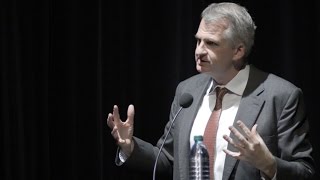


We saw the First World War, as you say, the Great Depression, the Second World War. That pattern of the late 19th century, we saw it break. And interestingly, there was also a similar rhetoric of optimism, the idea that trade would lead to enlightenment, would lead to liberalism, would lead to peace. The first globalization was the late 19th century and the early 20th century, when there was a similar expansion of world trade, export-led growth. The globalization we’re in now is the second one. When we think about globalization today, we imagine that it’s the first globalization, that everything about it is new. TIMOTHY SNYDER: That’s a wonderful question, because it helps us see how history can brace us, can give us a kind of grounding. Do you see-what parallels do you see between that period in the ’30s and our situation today? The masses of people in the world had been exposed to these imperialist wars, and there was tremendous insecurity. JUAN GONZÁLEZ: Well, Professor Snyder, in terms of the rise of tyranny in the 20th century, clearly, the rise of fascism came in the period after World War I. We’ve-20th century authoritarians have learned that the way to dismantle systems like ours is to go after one institution and then the next, which means that we have to have an active relationship, both to history, so that we can see how failure arises and learn from people who tried to protect institutions, but also an active relationship to our own institutions, that our institutions are only as good as the people who try to serve them. My sense is that we’ve seen institutions like our own fail. I think our mistake at present is to imagine that the institutions will automatically continue to protect us. The framers, looking at classical examples from Greece and Rome, gave us the institutions that we have. The expectation should be failure rather than success. The point of using the historical examples is to remind ourselves that democracies and republics usually fail. My tendency is to look at examples from other places and to ask what we could learn. Like the framers of the Constitution, I’m not an American exceptionalist. TIMOTHY SNYDER: So, I guess the place to start would be with the quotation. Can you talk about, well, just what we quoted you saying there? Do you think that the United States is-is headed towards tyranny? Welcome to Democracy Now!, Timothy Snyder. Professor Synder is also the author of Bloodlands: Europe Between Hitler and Stalin, as well as Black Earth: The Holocaust as History and Warning. Our one advantage is that we might learn from their experience.” That’s from On Tyranny: Twenty Lessons from the Twentieth Century by Timothy Snyder, Levin Professor of History at Yale University, where he joins us now. We are no wiser than the Europeans who saw democracy yield to fascism, Nazism, or communism.

Today, our political order faces new threats, not unlike the totalitarianism of the twentieth century. It is titled On Tyranny: Twenty Lessons from the Twentieth Century.ĪMY GOODMAN: Professor Snyder writes, quote, “The Founding Fathers tried to protect us from the threat they knew, the tyranny that overcame ancient democracy.

JUAN GONZÁLEZ: We spend the rest of the hour with award-winning author and Yale University history professor Timothy Snyder, whose new book draws on his decades of experience writing about war and genocide in European history in order to find lessons that can help the United States avoid descending into fascist authoritarianism.


 0 kommentar(er)
0 kommentar(er)
